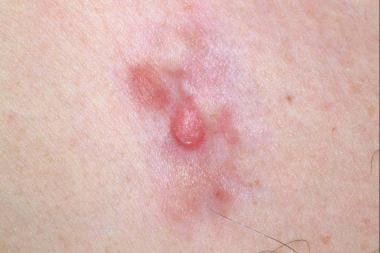Dermatofibrosarcoma Protuberans (DFSP)
 Dermatofibrosarcoma protuberans (DFSP) is a rare form of skin cancer that begins in connective tissue cells in the dermis (middle layer of the skin). This type of cancer may first appear as a scar or a bruise. Lumps of tissue (protuberans) may form near the skin surface as it grows. The skin cancer often forms on the legs, arms, and trunk.
Dermatofibrosarcoma protuberans (DFSP) is a rare form of skin cancer that begins in connective tissue cells in the dermis (middle layer of the skin). This type of cancer may first appear as a scar or a bruise. Lumps of tissue (protuberans) may form near the skin surface as it grows. The skin cancer often forms on the legs, arms, and trunk.
DFSP skin cancer has a slow growth and rarely spreads beyond skin cells. Texas Surgical Dermatology, led by board certified dermatologist Dr. Tri H. Nguyen, provides treatments for DFSP skin cancer to patients in Houston, Katy, Spring, The Woodlands, Texas, and surrounding locations.
Diagnosing Dermatofibrosarcoma Protuberans
Procedures and tests used for diagnosing dermatofibrosarcoma protuberans include:
- Skin examination: Your physician will inspect the skin carefully for understanding your condition.
- Skin biopsy: A small amount of tissue will be removed by the doctor for testing. Specialized laboratory tests will determine whether cancer cells are present.
- Imaging tests: Your doctor may recommend MRI and other imaging tests for better understanding the extent of cancer to help with treatment planning.
Treating DFSP Skin Cancer
Treating dermatofibrosarcoma protuberans generally involves surgical removal of the cancer. Other treatments may be required for killing cancer cells that are not removed in the surgery.
- Excisional surgery
Doctors may recommend excisional surgery for removing the cancer cells and healthy tissues surrounding it. This treatment option has a higher likelihood for removing all cancer cells.
- Mohs surgery
Mohs surgery is usually recommended for many DFSP patients. This is a specialized surgery that is used for treating skin cancer. The surgery allows for less removal of healthy tissue during excision. Your surgeon will cut out the tumor during Mohs surgery with a small margin of healthy tissue around the tumor. The surgeon will use a microscope to look for cancer cells in the excised tissue.
Your Mohs surgeon will remove another layer of tissue if there are cancer cells at the edge of it. They will look at the newly removed layer of tissue under the microscope for cancerous cells. This process will continue until there are no more cancer cells along the removed tissue edge.
The surgeon will state that the margins are clear when there are no more cancerous cells along the edge of the excised tissue layer. This surgery is particularly helpful when it comes to treating larger types of cancers. This is because DFSP skin cancer usually grows in an irregular shape which makes its complete removal difficult.
- Targeted therapy
Targeted therapy involves the use of drugs for attacking cancer cells by focusing on particular traits which make them vulnerable. Few people suffering from dermatofibrosarcoma protuberans have cancer cells which produce a type of excess protein. Imatinib (Gleevec) is useful in targeting these cells and causing them to die. This treatment option is generally recommended in case the cancer returns following surgery.
Need For Reconstructive Surgery
DFSP skin cancer can grow deep, which means patients may require reconstructive surgery for repairing the wound created during surgery. Board certified dermatologist Dr. Tri H. Nguyen at Texas Surgical Dermatology receives patients from Houston, Katy, Spring, The Woodlands, Texas, and nearby areas for DFSP skin cancer treatment.
For More Information contact our Board Certified in Dermatologists at Texas Surgical Dermatology in Spring, TX
For more information on procedures and treatments offered at Texas Surgical Dermatology PA please call 832.663.6566 or click here to contact our dermatologists. Helping patients in Houston, The Woodlands, Spring, Katy and other surrounding areas of Texas.

